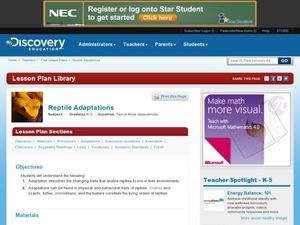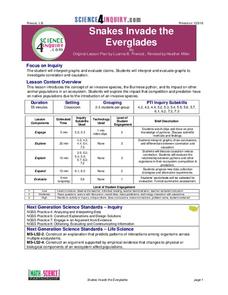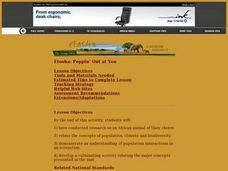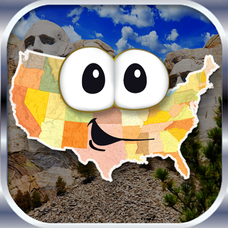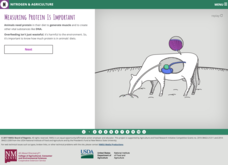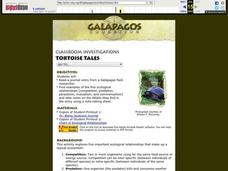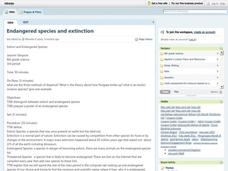Curated OER
Reptile Adaptations
Young scholars research animal adaptations. In this adaptations lesson, students research the physical and behavioral adaptations of animals. Young scholars create a diagram of their animal labeling it's adaptations.
Science 4 Inquiry
Snakes in the Everglades
The Burmese python is on the loose ... and he's hungry! Illustrate the differences between causative and correlative relationships through an inquiry lesson. Pupils examine several sources of information to determine if there is a...
American Museum of Natural History
What's This? Reproduction
Attracting the right mate is as important for humans as any other species. An interesting lesson teaches individuals about several strategies that animals and plants have adapted to attract their mates. From colorful nests to powerful...
Curated OER
Etosha: Poppin' Out at You
Tenth graders research an African animal of their choice and relate the concepts of population, climate and biodiversity to their animal. They examine how population interacts in an ecosystem.
Curated OER
How Many Birds Would It Take To Keep A Jackal Alive?
Students examine the role of large families in some animal populations. They work together to complete an activity related to food supply. They discover the relationship between preys and predators.
Curated OER
Habitats and Adaptations
Young scholars research and describe the habitat and adaptations of a reef animal. After the student is assigned a habitat, they design and draw a cresture adapted to eat each food and to live in each habitat.
Curated OER
How Many Penguins Does It Take? Studying Carrying Capacity and Limiting Factors
How does a population's habitat determine the size of that population? Teach learners about carrying capacity and limiting factors with an engaging roleplay activity. Class members pose as a colony of penguins who must gather food amidst...
Concord Consortium
Track of Dreams
Don't run from the resource—sprint to it. Using an engaging performance task, scholars consider a set of constraints on the creation of a track. Given several possible designs, they determine if the designs meet the constraints. If not,...
K12 Reader
Competing for Resources
Young biologists examine the concept of scarce resources with a reading comprehension passage. After finishing the paragraphs, learners turn to the questions to demonstrate what they have learned about what is beneficial and what is...
Happy Moose Apps
Bitsboard - Education, Games, and Flashcards for Learning Reading, Spelling, and more
Learn everything from sight words to French vocabulary with this versatile study app. While the material that comes pre-loaded on the app is mostly based on learning how to read and spell, the app has the potential to be useful for any...
Carolina Biological Supply
Chemistry Formula Practice
Practice naming chemical compounds or stating the formula when given the name. Discover how well you have mastered these skills either by time or percentage correct.
Freecloud Design
Stack the States™
Kids have fun learning US geography and state facts, including capitals, nicknames, major cities, and landmarks. They can choose between the game, or informational flashcards for each state.
ARKive
Darwin and Natural Selection
A presentation on Darwin's theory of evolution and natural selection could be a good addition to your biology class. It provides general information about how animals adapt to their surroundings, as well as how organisms create more...
Pearson
Articles: Indefinite
When do you use a or an before a noun? What about the? Learn about indefinite and definite articles with a brief grammar presentation, which focuses on using context clues to determine proper article usage.
Howard Hughes Medical Institute
Scientific Inquiry Using WildCam Gorongosa
How do scientists determine what questions to ask to meet their research goals? Help your class develop an inquiry mindset with a lesson based on studies in the Gorongosa National Park. Partners create their own research questions by...
Learning Games Lab
Nitrogen in Feed
Knowing what farmers are feeding livestock is just smart business. A WebQuest lesson helps learners build an understanding of the relationship between amino acids, nitrogen, and protein. With interactive instruction,...
Learning Games Lab
Nitrogen in Fertilizer
Nitrogen is an essential element for productive farming. An interactive lesson explores the chemical makeup of different fertilizers and their corresponding nitrogen content. The interactive challenges individuals to complete...
Learning Games Lab
Scientific Graph Reading
Interpreting graphs is an essential skill for young scientists. An interactive online lesson gives individuals an opportunity to review the components of a graph and learn to read and interpret the shape of a graph. The lesson includes...
Curated OER
Birds & Caterpillars
In this biology worksheet, students explain the use of camouflage as a defense mechanism. Then they list examples of insects that use camouflage to protect them from predators. Students also identify and name other types of defense...
Curated OER
Tortoise Tales
Students read journal entry from a Gal??pagos field researcher, find examples of five ecological relationships (competition, predation, parasitism, mutualism, and commensalism) and take notes on the details they find in the entry using a...
Curated OER
Endangered Species and Extinction
Eighth graders determine the difference between extinction and endangered species. Using the internet, they research one endangered species, identify its common and specific name, where it lives and what it eats. To end the lesson,...
Curated OER
A Cat-and-Mouse Story
Students view an animated PowerPoint program that teaches possessive vocabulary in Spanish. They review English grammar. Students access high-frequency verbs and additional vocabulary.
Curated OER
Design-A-Weed
Students create a "super weed" that prospers in teh harsh conditions on plant Weediv. They comprehend how weed adaptations give the plants an advantage over native plants. Students define the term adaptation. They give three examples...
Curated OER
Critters in Your Own Backyard
Students identify various animals and their habitats, as well as their specific traits In this animal habitat lesson, students list animals they've seen in their backyard. Students select one animal and do research. Students then answer...


